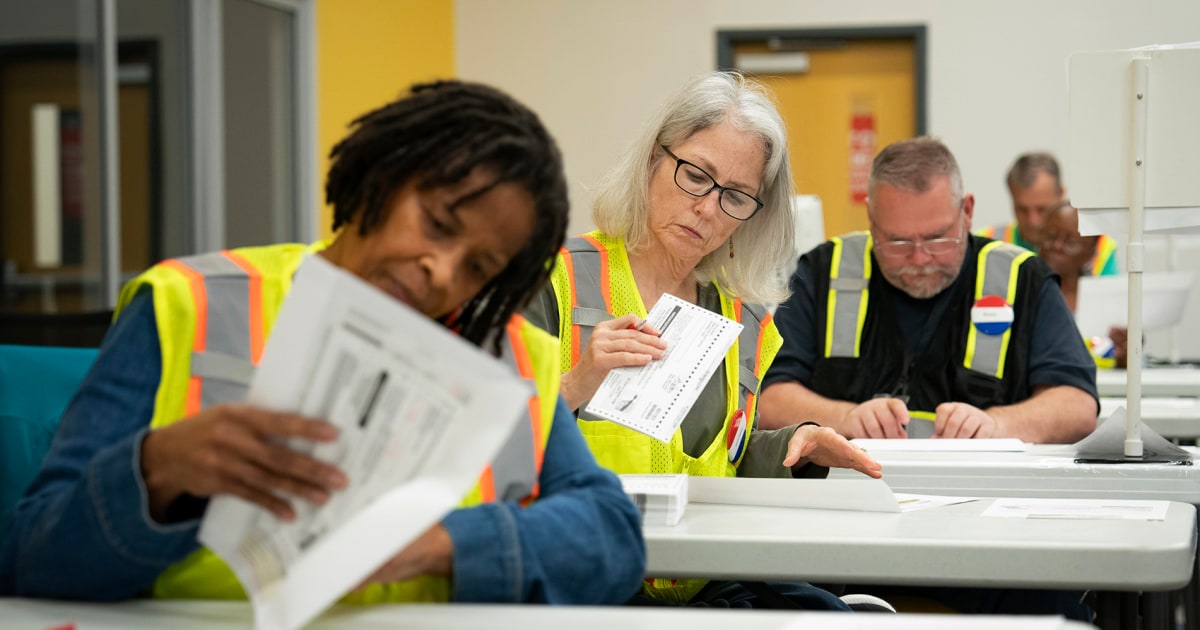Hurricane Helene has caused significant disruptions for election officials in North Carolina and across the southeastern U.S., scrambling preparations for early and mail voting that have been in the works for months.
In western North Carolina, one of the areas hit hardest by the storm, election officials were working Monday to evaluate what changes needed to be made in a key presidential battleground state where mail ballots starting going out last week and early in-person voting is scheduled to begin in three weeks.
North Carolina officials mailed 190,000 ballots last week, some of which may be delayed or destroyed by flooding. Mail service is suspended to many areas, which will halt the transport of the ballots. And there’s more pressure for voters to get their ballots in early this year: state legislators recently eliminated a grace period that allowed ballots with an on-time postmark to be counted even if they arrived three days after the election.
At least 14 county election offices are closed and are expected to be for several days, said Karen Brinson Bell, executive director of the North Carolina State Board of Elections.
“At this point in time as we know it, all the members of our elections community are safe and sound and preparing themselves to serve all eligible voters in North Carolina,” Brinson Bell said, noting that these officials were working through challenging circumstances with power outages, limited cell service, and impassable roads. One staffer in Buncombe County walked more than four miles to work today, she said.
The state’s board of elections voted Monday to give counties the ability to reschedule board meetings where absentee ballot applications are reviewed.
Brinson Bell said state officials will soon publish a website for hurricane-related information and hold a media briefing on Tuesday to outline procedures for voters to cite a natural disaster as reason they don’t have photo ID, which is required to vote in North Carolina.
Even ballots sent from unaffected counties could be impacted said Gerry Cohen, a member of the Wake County Board of Elections, if they’re traveling to or through the western part of the state.
“Anything to or from western North Carolina is probably greatly impacted by that. It would even affect Wake County,” Cohen said (Wake County, home to Raleigh, is further east).
Cohen said voters who have been displaced by the storm or don’t end up receiving their mail ballot can cancel it and request another one, though voters will need to contact their local election office, which may be closed, to do so. They can also opt to vote in-person, a move that will “spoil” their mail ballot so that it cannot be counted even if returned at a later date, according to the state’s voting site.
Election officials were originally slated to start sending mail ballots Sept. 6, but were delayed after former third-party presidential candidate Robert F. Kennedy sued to remove himself removed from the ballot. His lawsuit, which was successful, forced the state to reprint its ballots. Officials starting mailing ballots to overseas and military voters on Sept. 20 and all other voters who requested them on Sept. 24
Early in-person voting is scheduled to begin on Oct. 17 in North Carolina across more than 400 locations. Each site in the affected counties will need to be checked for accessibility, power and water.
Cohen also warned that the hurricane could cause staffing issues. Election officials will need to make sure their poll workers — many of whom he said will have already been trained — haven’t been displaced and can still work their scheduled shifts for the early voting period and on Election Day.
North Carolina is among the core battleground states former President Donald Trump and Vice President Kamala Harris are competing in this fall. About 7% of the state’s voters cast their ballots by mail in the 2022 midterm elections. The area of North Carolina hit by the hurricane tends to lean Republican politically, aside from Democrat-heavy Asheville.
Election officials in other states affected by Hurricane Helene, including Florida, Georgia, South Carolina and Tennessee, are also facing challenges.
Robert Sinner, communications director for the Georgia secretary of state’s office, said most counties were spared substantial impact by the storm, though the Jenkins County elections office has faced some physical damage.
TJ Lundeen, a spokesman for the South Carolina State Election Commission, said they anticipate some early voting center and Election Day sites will need to change.
Doug Kufner, spokesman for the Tennessee secretary of state, said at least six Election Day polling sites, and two county election offices in northeast Tennessee have experienced damage or will have driving accessibility issues.
“The election community in Tennessee is united; when one hurts, we all hurt. The heartache, shock, and devastation are massive,” he said in an email. “However, we are confident that the challenges caused by the flooding will be overcome because of the planning and resilience of election officials in the impacted counties.”

Leave a Reply